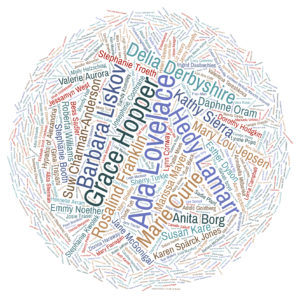“I will publish a blog post on Tuesday 24th March about a woman in technology whom I admire but only if 1,000 other people will do the same.”
Ten years ago today I and hundreds of other people around the world celebrated the very first Ada Lovelace Day. We wrote blog posts about women that we knew or admired, the work they did and why they inspired us. I went to the Science Museum and recorded an interview with ‘Ada Lovelace’, an actress who explained Lovelace’s work and how the model Analytical Engine works.
Back in 2009, blogging was still popular, and it seemed like a really easy way for people to get involved. The idea was simple: Create a day of blogging when everyone would write about women in tech (or, in reality, STEM). We’d create a database of posts, and it would be a great resource for people wanting to find conference speakers, or expert voices, or just some good old fashioned inspiration.
I will admit that I originally thought it would be just me and a few friends, but 1,978 people signed up on Pledgebank, and about another 1,600 people signed up on Facebook. Somehow, I had captured the zeitgeist – Ada Lovelace Day was covered across the UK media and I found myself appearing live on the BBC News Channel to talk about it.
Of the 3,600 people who pledged to write a blog post, 1,237 added a URL to our map, and whilst that map is no longer available on the internet, you can still browse the list of blog posts on Archive.org’s Wayback Machine. Although some of them are lost to the mists of time, there are still some great blog posts to peruse.
Amongst the participants in that first festival of blogging were The New Scientist, ITPro, The Guardian, The Guardian Digital Content blog, The Guardian opinion page, Electronics Weekly, Computer Weekly, Computer Weekly again, BCS, the BBC, the BBC Internet blog, BBC News blog, O’Reilly Media, including a post from Tim O’Reilly himself, Nature, Vox, The Telegraph, Gartner, Discover magazine, Anita Borg, Mental Floss, Fast Company and Wellcome Library.
American electronics retailer AdaFruit adopted Ada Lovelace Day and have celebrated it every year since. And other notable supporters included Sydney Padua whose webcomic for the day evolved into a hugely successful graphic novel The Thrilling Adventures of Lovelace & Babbage; Lynn Featherstone, who was at the time an MP but is now Baroness Featherstone and serves in the House of Lords; award-winning author Naomi Alderman; science journalist and broadcaster Angela Saini.
 In total, 843 women were named in our database, and you can see who was most popular in the word cloud on the right there. Unsurprisingly, Ada Lovelace herself and Rear Admiral Grace Hopper were very popular, but was what really lovely was the huge variety of women who were featured. Many posts featured “my mum”, “my daughter”, or “my colleagues”, and there undoubtedly many more women mentioned in the blog posts whose names were never entered into our database.
In total, 843 women were named in our database, and you can see who was most popular in the word cloud on the right there. Unsurprisingly, Ada Lovelace herself and Rear Admiral Grace Hopper were very popular, but was what really lovely was the huge variety of women who were featured. Many posts featured “my mum”, “my daughter”, or “my colleagues”, and there undoubtedly many more women mentioned in the blog posts whose names were never entered into our database.
Right from the beginning, Ada Lovelace Day was international, and we had posts in 18 different languages: Catalan, Croatian, Danish, Dutch, English, Esperanto, Finnish, French, German, Italian, Marathi, Norwegian, Portuguese, Slovenian, Spanish, Swedish, Turkish, and Welsh. Because we lost the map, we sadly can’t get an accurate count of how many countries were represented, but it’s a fair bet to say that we would have seen pins in at least 16.
I am grateful to everyone who took part in the first Ada Lovelace Day, but particularly to Stephanie Troeth and Stephanie Booth who both helped me immensely with promotion and support.
Once the day was over, I did wonder what would become of it. It wasn’t immediately clear that it had legs beyond that one day, but a year later, I indeed found myself organising the second Ada Lovelace Day. Now, ten years on, Ada Lovelace Day is well established in the annual calendar, and is celebrated all around the world.
We work year-round to support women in STEM, and our growth shows no sign of slowing down. As well as organising Ada Lovelace Day, and our annual ‘STEM cabaret’ event, Ada Lovelace Day Live, we have also published two anthologies of biographies of women in STEM, a line of free women in STEM crochet patterns, and a podcast highlighting the work of women in STEM. We have run an Online Recruitment Fair for Women in STEM, and created a number of careers posters as part of a free education pack for teachers. Our Twitter campaigns have included a Christmas STEM advent calendar and the Twelve Days of STEMmas.
We have so many exciting projects planned for 2019, including a new peer mentorship and knowledge sharing network for women in STEM and their advocates. We’re hoping to launch that later this year, and you can help us out by answering a few questions!
Over the years, Ada Lovelace Day has been celebrated by millions of people around the world, and we want to reach millions more. So here’s to another ten years of Ada Lovelace Day!